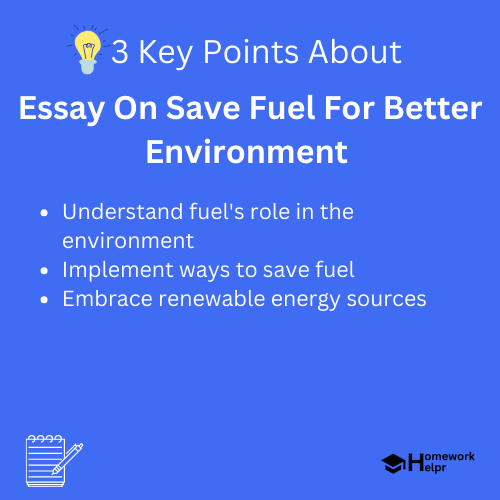📝 Summary
In today’s fast-paced world, the importance of saving fuel is crucial for a healthier environment. The excessive use of fossil fuels leads to severe consequences, including air pollution, climate change, and habitat destruction. However, students and children can contribute to this cause by adopting simple practices such as using public transportation, carpooling, and promoting eco-friendly habits. Saving fuel not only reduces costs but also improves air quality and conserves precious non-renewable resources. Moreover, transitioning to renewable energy sources can significantly mitigate environmental harms and benefit future generations. Together we can create a cleaner, greener world.
Essay On Save Fuel For Better Environment
In today’s fast-paced world, fuel plays a crucial role in powering our vehicles, industries, and ensuring our daily activities. However, the indiscriminate use of fuel not only depletes non-renewable resources but also contributes significantly to environmental degradation. This is why it is imperative for students and children to understand the importance of saving fuel for the betterment of our environment.
Understanding Fuel and Its Importance
Fuel refers to substances that can be burned to produce energy. The most common types of fuel are fossil fuels, such as oil, coal, and natural gas, which are formed from the remains of ancient plants and animals. The importance of fuel cannot be overstated; it drives our transportation systems, generates electricity, and powers various industrial processes.
Definition
Fossil Fuels: Natural substances derived from decomposed organisms that can be burned for energy.
While fuel is undeniably important, the environmental impacts associated with its consumption are alarming. Burning fossil fuels releases harmful gases, including carbon dioxide (CO2), which contributes to global warming and climate change.
Examples
For instance, when a car burns gasoline, it emits CO2, a greenhouse gas that traps heat in the atmosphere, leading to rising temperatures.
The Environmental Impact of Fuel Consumption
The continuous extraction and consumption of fuel have dire consequences for our planet. Here are some key environmental impacts:
- Air Pollution: Emissions from burning fuel result in air pollutants that can cause respiratory illnesses and other health problems.
- Climate Change: Increased levels of greenhouse gases lead to global warming and unpredictable weather patterns.
- Habitat Destruction: Oil extraction and coal mining result in the destruction of natural habitats, endangering wildlife.
These impacts underscore the necessity of conserving fuel not only to protect our environment but also to enhance our quality of life.
Ways to Save Fuel
Saving fuel can be achieved through a variety of means. As students and children, there are numerous strategies you can adopt to contribute towards this global endeavor:
- Use Public Transportation: Opting for buses or trains instead of individual vehicles can greatly reduce fuel consumption.
- Carpooling: Sharing rides with friends not only saves fuel but also cuts down on traffic congestion.
- Maintain Your Vehicle: A well-maintained vehicle runs more efficiently, thus using less fuel.
- Adopt Eco-friendly Practices: Encouraging walking or cycling for short distances can significantly lessen fuel usage.
❓Did You Know?
The world’s first car was invented in the late 19th century, and it consumed around 15 miles per gallon of fuel, which is less efficient than many modern vehicles that can achieve higher mileage.
By implementing these practices in our daily lives, we can collectively make a substantial difference in fuel conservation.
Benefits of Saving Fuel
Saving fuel has numerous advantages, not just for the environment but also for our personal finances and community well-being. Let’s explore a few of these benefits:
- Reduced Costs: Consuming less fuel means lower expenses on transportation and energy bills.
- Improved Air Quality: Less burning of fuel leads to fewer emissions, resulting in cleaner air.
- Conservation of Resources: Saving fuel helps preserve these non-renewable resources for future generations.
Examples
For instance, by biking to school instead of driving, a student not only helps save fuel but also stays fit and enjoys the outdoors.
The benefits of saving fuel are evident and appeal to both our individual interests and our collective responsibility towards the environment.
Renewable Energy: The Future of Fuel
As we advocate for saving fuel, it is also critical to consider alternatives that can help reduce our dependence on fossil fuels. Renewable energy sources, such as solar, wind, and hydroelectric power, offer sustainable choices that can significantly lower greenhouse gas emissions.
Definition
Renewable Energy: Energy that is generated from natural processes that are continually replenished, such as sunlight, wind, and rain.
Switching to renewable energy not only helps in curbing climate change but also enhances energy security as it lessens our reliance on imported fuels. Schools can play a pivotal role in this transition by incorporating renewable energy sources into their operations.
Examples
For example, a school that installs solar panels can power its lighting and heating systems with clean energy while educating students about energy conservation.
Conclusion
In conclusion, saving fuel is a fundamental responsibility that we must all embrace to ensure a better environment. By adopting effective measures, such as using public transportation, maintaining vehicles, and supporting renewable energy, students and children can lead this charge towards a more sustainable future. Remember, every small action counts, and the choices we make today will inevitably impact tomorrow’s world. Together, let us strive to save fuel for a cleaner, greener planet.

Related Questions on Essay On Save Fuel For Better Environment for Students and Children
What are the main types of fuel used?
Answer: The most common types are fossil fuels like oil, coal, and natural gas.
How can students save fuel?
Answer: Students can use public transport, carpool, and cycle.
What are the environmental impacts of fuel consumption?
Answer: It leads to air pollution, climate change, and habitat destruction.
Why is renewable energy important?
Answer: It reduces dependence on fossil fuels and helps curb climate change.
